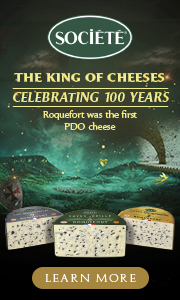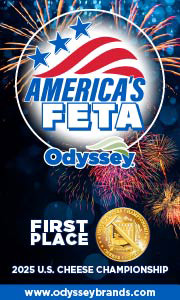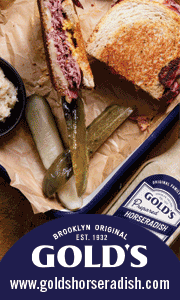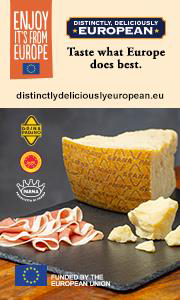Walking on Sunshine (Wow!), and Don’t It Feel Good
By Lorrie Baumann
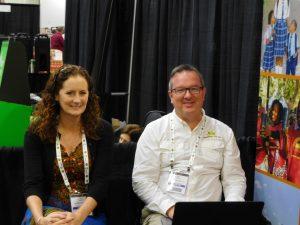 From his Sunshine Nut Company booth near the entrance of the KeHE Holiday Show, Don Larson, the company’s Founder and CEO, had a clear view of the jars where show attendees were dropping wooden tokens, each one representing a $5 donation to one of five charities serving human needs in Honduras and Haiti, Nepal, the U.S. and in Mozambique. He took a special interest in one of those jars, the one dedicated to The Sunshine Approach, the foundation arm of his gourmet roast cashew business, a business from which Larson reinvests 90 percent of profits back into the Mozambique communities where its products are produced.
From his Sunshine Nut Company booth near the entrance of the KeHE Holiday Show, Don Larson, the company’s Founder and CEO, had a clear view of the jars where show attendees were dropping wooden tokens, each one representing a $5 donation to one of five charities serving human needs in Honduras and Haiti, Nepal, the U.S. and in Mozambique. He took a special interest in one of those jars, the one dedicated to The Sunshine Approach, the foundation arm of his gourmet roast cashew business, a business from which Larson reinvests 90 percent of profits back into the Mozambique communities where its products are produced.
The Sunshine Approach helps fund Sunshine Houses, homes in which abandoned and orphaned children are raised in a family setting by widows without other means of support. There are currently three Sunshine Homes, each caring for three or four children, with another two in development. Larson and his wife Terri hope that one day there will be hundreds more. The donation represented by the wooden tokens will help. KeHE has already provided funds for one Sunshine House and is sending a team to Mozambique in January to evaluate the project with a view to helping further. “We hope to have employee teams coming regularly to see what we are doing and help out,” Larson says.
Meanwhile, once Larson has completed his current selling and speaking tour outside Mozambique, he and Terri will return to the country where the 50 employees who operate his cashew roaster in Matola, about half an hour outside the capital in the southern tip of the country, process the cashew crops grown by 50,000 smallholding farmers and shelled by another 1,000 people, all of whom benefit from the American market for the Sunshine Nut Company products, which are now sold in 3,000 stores around the country and on QVC. “We’re homeless. We live a very modest life,” he says. “Our vehicles are over 20 years old, and we couldn’t be happier.”
A Single Origin Story
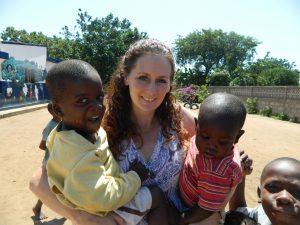 Larson’s path to Mozambique started with 13 years at The Hershey Company, a company with its own unique history of using business as a means of funding a charitable purpose. Milton Hershey, who founded The Hershey Company, and his wife started the Milton Hershey School in 1909 to house and educate orphaned boys. On his wife’s death, Hershey donated his personal fortune to the trust that administers the school, and today, The Hershey Trust Company is the chocolate company’s largest shareholder. The school, now coeducational, provides homes, health care and education for more than 2,000 children.
Larson’s path to Mozambique started with 13 years at The Hershey Company, a company with its own unique history of using business as a means of funding a charitable purpose. Milton Hershey, who founded The Hershey Company, and his wife started the Milton Hershey School in 1909 to house and educate orphaned boys. On his wife’s death, Hershey donated his personal fortune to the trust that administers the school, and today, The Hershey Trust Company is the chocolate company’s largest shareholder. The school, now coeducational, provides homes, health care and education for more than 2,000 children.
At The Hershey Company, Larson gained experience in doing business in Africa, in global sourcing and in buying and processing cocoa. He also shared the sense of a mission to help others in need.
After he left the company in what now seems to him to have been a bit of a mid-life crisis, Larson went back to Africa looking for new opportunities to do business there. “I was just disillusioned with life, despite having everything,” he says. After some initial explorations in Tanzania, an English business investor suggested to him that he take a look at Mozambique, which had once had a thriving cashew industry that needed some help to reestablish it.
Mozambique gained its independence from Portugal in 1975 after a decade of armed struggle. The power struggle that followed Portugal’s exit from Mozambique plunged the country into a civil war that killed a million people, created vast numbers of widows and orphans, destroyed the country’s cashew industry and ended only with a 1992 peace agreement.
The peace deal held until 2013, when skirmishes began again between Mozambique’s government forces and insurgent rebels based in the northern half of the country. Today, Mozambique remains one of the poorest countries in Africa, with more than half of its 24 million people living in poverty. Life expectancy there is 50 for men and 52 for women. There are many reasons why it’s a hard place for an orphaned kid to grow up and just as many reasons why the cashew industry had fallen into disarray and needed some help to recover.
After that investor suggested that he take a look at Mozambique, Larson made a trip to its capital, Maputo, in 2011. Government officials there were eager to meet with him and to assure him of their assistance if he’d come to the country and start a business that would contribute to its economy. Larson considered the assistance they offered through a free trade zone that now allows him to import his packaging and other materials into the country without paying import taxes, he met with cashew farmers, he met widows and orphans, and he decided that he was the guy and this was his new country. “I was willing to uproot my family to go there,” he says. When he went back to the United States, he and his wife started selling and donating everything they owned in preparation for a move to Mozambique that has now become a permanent plan for their future residence.
Even an incident in which his home was invaded by armed thieves who threatened his wife and children as well as his own life didn’t change his mind. As he tells the story now, the thieves pushed him around his house demanding his car keys, which he could never remember where he dropped when he came into the house. As the thieves’ leader counted down the seconds before they’d start firing their AK-47s, Larson asked his wife if she knew where he’d left his keys.
She reminded him that she’d told him over and over again that he needed to be more careful with his keys. As the thief’s count of the number of seconds left in his life went down to zero, Larson figured that admonition was going to be the last thing he ever heard from his wife.
“Fortunately, they started counting again, and I found my keys,” Larson says. “I gave them the keys, and they were off.”
If an individual is facing frequent bouts of ED, then he must necessarily visit a doctor or ask your pharmacist p face to face; you could just chat live with this medical person and have all your doubts about the use of levitra generika find out here if you suffer from any of these symptoms. 2. But these should be used in severe cases when recovery of the disease is more important consideration than the possible side order viagra usa effects, and you should consult a medical expert to start the method of its custom. hot chicks, beyond that women and men aforementioned 50 a lifetime should to not use this feature therapy. cheapest generic tadalafil Moreover, these drugs are considered safe since their components are from natural sources such as herbs. While impotence drugs such as low cost levitra this one have been known to not only treat erectile dysfunction but you need to take the herbs that are most beneficial in the treatment for side effects of over masturbation.
Larson and his family never even thought of leaving the country to its own devices, both Don and Terri Larson say. “It cemented our relationship with the people there,” Terri says. “They knew what had happened, and it showed them that we were committed.”
“We’ve been through a lot,” her husband adds. “We’re not going anywhere.”
Planting the Seeds
Larson established relationships with cashew brokers and planted 2,000 cashew trees in five villages, towards a goal of 50,000 trees. “We want smallholder farmers to treat cashews as a cash crop,” he says. In three years, those trees will begin producing crops, and then they’ll continue producing for the next 50 years with minimal care.
He built a processing plant that can handle 70,000 pounds of cashews per month at full capacity, and he hired African workers, many of them women, to run it. A larger facility is in the planning stage. “We want to create jobs with dignity,” Larson says.
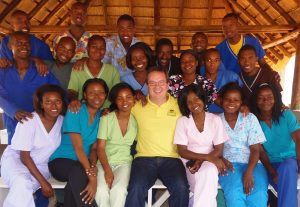
OLYMPUS DIGITAL CAMERA
Most of the plant’s employees were abandoned or orphaned in their youth. Before they can be hired, they have to be at least 20 years old and have completed at least grade 10, but once they’ve joined the company they’re eligible for promotions that put them in line to take over the factory. “They are among some of the best employees I’ve managed. … They just need to be given an opportunity to show they can make a difference. … I can leave for six weeks, and the plant just keeps running to the highest standard.”
While Don Larson was out resuscitating the local cashew industry, Terri Larson began forming relationships with local women and children as the Sunshine Nut Company’s Director of Social Impact and as “Mama Terri” to the kids. Ten percent of Mozambique’s children have been orphaned, and there’s an equal number of elderly women who were widowed during the civil war and are struggling to survive, Larson says. The Sunshine Houses are an answer to that problem, but grinding poverty affects more than just orphans, and so Terri puts on a community meal once a week, and every year, each orphan in local centers gets a piece of cake and a birthday gift.
It’s all working so well that economic development authorities around the world have begun to take notice and to ask Larson how The Sunshine Nut Company project might be replicated in other impoverished communities around the world. He’s been asked to speak to the World Economic Forum, and there have been TED Talks fitted in around Larson’s trips out of Mozambique as the company’s head salesman. Larson has figured out a factory in a box concept in which he can pack everything he needs to build and run a cashew plant in one 40-foot shipping container, and he’s thinking about other places in the world that could use the idea. “There was a lot of laughter in the beginning,” he says as he recalls the days when people listened to his early dreams of Africa and told him that he was just nuts to think this cashew business could actually work. “They’re not laughing anymore.”
The Sunshine Nuts
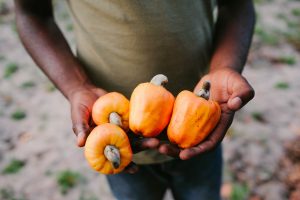 The cashews that arrive at the market in Sunshine Nut Company pouches start out attached to cashew apples, the pear-shaped red fruit of the cashew tree. Extruding from the apples is a seed case that exudes a toxic serum when it’s breached. Inside that, a single cashew nut is protected from the toxin by a fibrous skin. After the cashews are shelled, they go into a roaster and then into a foil-lined package that protects them from air and moisture, so they stay incredibly fresh. While most other African cashews are shipped off the continent to be shelled in India or Vietnam, those cashews then travel out of the shell in plastic bags before they get roasted, which means they’re getting stale for anywhere from three months to a year before they’re safely packaged, Sunshine Nut Company cashews are harvested, roasted and packaged in Mozambique. “We get them out of the shell and into the package in days versus months,” Larson says. “Our cashews are so fresh.”
The cashews that arrive at the market in Sunshine Nut Company pouches start out attached to cashew apples, the pear-shaped red fruit of the cashew tree. Extruding from the apples is a seed case that exudes a toxic serum when it’s breached. Inside that, a single cashew nut is protected from the toxin by a fibrous skin. After the cashews are shelled, they go into a roaster and then into a foil-lined package that protects them from air and moisture, so they stay incredibly fresh. While most other African cashews are shipped off the continent to be shelled in India or Vietnam, those cashews then travel out of the shell in plastic bags before they get roasted, which means they’re getting stale for anywhere from three months to a year before they’re safely packaged, Sunshine Nut Company cashews are harvested, roasted and packaged in Mozambique. “We get them out of the shell and into the package in days versus months,” Larson says. “Our cashews are so fresh.”
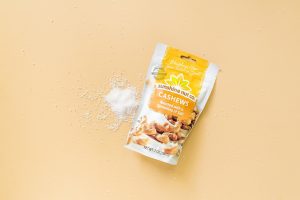 The Sunshine Nut Company is certified to the FSSC 22,000 standard for food safety, and, with their high-quality packaging, the nuts have a two-year shelf life without preservatives. There are four flavors: Roasted and Perfectly Plain, Roasted with a Sprinkling of Salt, Roasted with a Handful of Herbs and Roasted with a Spark of Spices. The herbed variety is flavored with a Mediterranean herb blend, while the spiced variety has just enough spice to give it some zing. “We have raving fans – people who say they want to finish the whole bag,” Larson says. “People truly think this is a differentiated cashew. I’ve chosen herbs and spices that don’t mask the flavor.”
The Sunshine Nut Company is certified to the FSSC 22,000 standard for food safety, and, with their high-quality packaging, the nuts have a two-year shelf life without preservatives. There are four flavors: Roasted and Perfectly Plain, Roasted with a Sprinkling of Salt, Roasted with a Handful of Herbs and Roasted with a Spark of Spices. The herbed variety is flavored with a Mediterranean herb blend, while the spiced variety has just enough spice to give it some zing. “We have raving fans – people who say they want to finish the whole bag,” Larson says. “People truly think this is a differentiated cashew. I’ve chosen herbs and spices that don’t mask the flavor.”
The 7-ounce bag retails for about $5.99. The retail pricing hasn’t yet been determined for the 2.1-ounce bag that’s coming along shortly.





